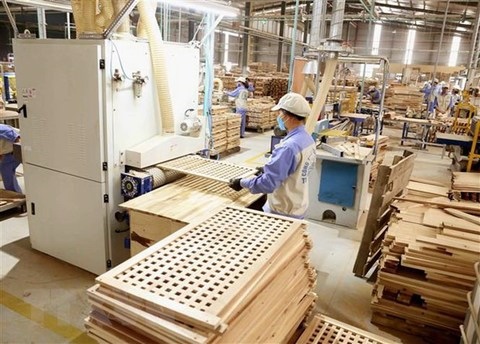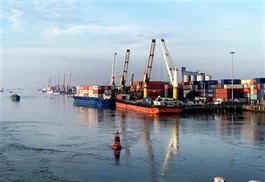Forestry industry aims for $17.5 billion in exports in 2024
Forestry industry aims for $17.5 billion in exports in 2024
The forestry industry set an export target of US$17.5 billion to contribute 23 million cubic metres of wood from planted forests in 2024.

Workers at Woodsland JSC in the northern province of Tuyên Quang process wood products for export to the EU. — VNA/VNS Photo |
This aim was revealed by Triệu Văn Lực, Deputy Director of the Forestry Department under the Ministry of Agriculture and Rural Development, at the conference about the sector’s performance this year and to outline development orientations for 2024 this week.
Lực highlighted that the sector would advance the multipurpose value of forest ecosystems and create a sustainable forestry economy through efficient use and management of forest resources. It would also protect and sustainably develop 100 per cent of existing forest area, while diversifying production under green, sustainable and circular practices. This effort would be supported by developing collaboration and association structures within the forestry supply chain.
The industry would also strengthen the quality management of forestry plant varieties that contribute to the ecosystem to increase the productivity and output of planted forests, developing large timber production forests.
In 2023, the forestry sector marked a significant milestone when the processes were completed to transfer 10.3 million tonnes of carbon emission reduction to the Forest Carbon Partnership Facility (FCPF) through the World Bank (WB) at a unit price of $5 per tonne of CO2, amounting to $51.5 million.
The Việt Nam Forest Protection and Development Fund recently received the first payment of $41.2 million from the WB and already disbursed the payment to the provinces, making urgent plans to pay forest owners in six provinces, including Thanh Hóa, Nghệ An, Hà Tĩnh, Quảng Bình, Quảng Trị and Thừa Thiên-Huế.
Promote trade in forestry products
The department estimated that forest product exports reached $14.39 billion this year, down 15.8 per cent compared to 2022. This decline is caused by market instability, affected by the Russia-Ukraine conflict and tightening spending in the US and EU markets on non-essential products, including wood.
Moreover, Vietnamese businesses also face difficulties when the EU adds many new regulations such as the carbon border adjustment mechanism (CBAM), including the wood industry and the EU's Anti-Deforestation Regulation.
To boost wood and forest product exports in the upcoming time, the industry aims to develop legal sources of wood from planted forests to meet production standards by developing concentrated planted forests and sustainably grown forests. It also encourages creating conditions for EU suppliers to promote raw materials in Việt Nam while controlling imports from high-risk areas.
In addition, a green economy model is being piloted in the wood industry with net-zero commitments. The Ministry of Agriculture and Rural Development is proposing a legal framework with specific regulations and providing support to businesses implementing green production activities to reduce carbon emissions and meet market requirements.



























